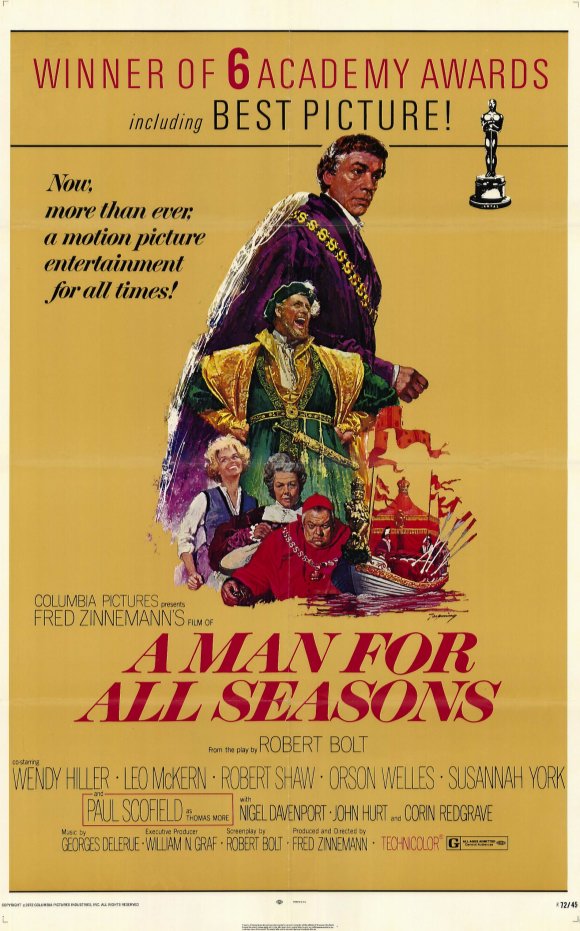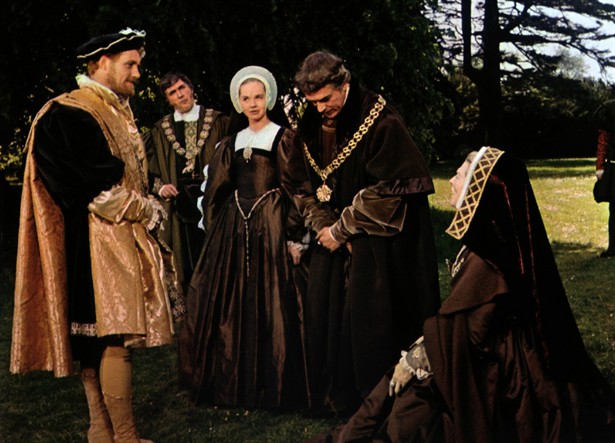A MAN FOR ALL SEASON (1966)
A Most Noble Man...
There have been many films made about noblemen. A Man For All Seasons is, however, a film about a noble man, one who stood by his principles and convictions at the cost of his life. Sir Thomas More would not bend, not even to his King, opting to pledge loyalty to the King of Kings rather than the King of England. Pretty much forgotten now, A Man For All Seasons is still a brilliant film, deliberately paced, with solid performances from some of Britain's best actors, a period film that doesn't drown in excess but that focuses on the intellect.
Sir Thomas More (Paul Scofield), devout Catholic and shrewd lawyer, is a loyal member of the King's Council. Nevertheless, he is the only Council member opposed to the idea of the crafty Cardinal Wolsey (Orson Welles) on The Great Question: the potential divorce of King Henry VIII (Robert Shaw) from his wife Catherine of Aragon (no relation) to marry the 'fertile' Anne Boleyn (Vanessa Redgrave in a cameo). More cannot bring himself to agree to a persecution of the Church to bring about the desired results from Rome, and his 'moral squint' as Wolsey calls it, makes him Wolsey's enemy.
After Wolsey's death, More becomes Lord Chancellor, but this is a heavy burden, for King Henry is determined to get his divorce. Torn between his conscience and his duty, More fears he cannot do his duty to both. More has a new enemy: Thomas Cromwell (Leo McKern), a passionate Protestant who also detests More' morality. Cromwell finds an ally in the improbably named Richard Rich (John Hurt), a protégé of More who is denied a place at Court by More because More thinks it will corrupt Rich rather than ennoble him. When Parliament passes the Act of Supremacy, declaring Henry head of the Church in England and the churchmen pledge loyalty to him and not the Pope (and also, it is understood, give him the divorce). More resigns his Chancellorship but makes no comment on anything. His wife, Lady Alice (Wendy Hiller) is not pleased by all this; their daughter Margaret (Susannah York), whom they call Meg and who against convention of the time is highly educated, stands by her father, as does her husband Will Roper (Corin Redgrave), who has come around to leaving Lutheranism (which More dislikes).
Still, Henry is determined to have the highly-respected and honest More on his side. If More either spoke in favor of the new laws, or at least attended Henry's wedding to Mistress Anne, it would in essence place a seal of approval on everything. More's stubbornness in holding to his principles only infuriates both King and Cromwell, with Rich now playing opportunist, abandoning More to go to Cromwell (who can get him a place at Court). Rich also brings up dubious charges of bribery against More thanks to an odd series of circumstances involving a silver cup. More knew it was a bribe but it was handed to him so quickly he could not return it. Instead, he gave it to Rich and used it as an example of what could happen to a good man at Court, the power of corruption too strong for those who have no guiding set of principles.
A new act of Parliament demands that all loyal subjects take an oath on pain of high treason. More asks Meg about the oath, seeing himself clear to being able to take it IF the words can clear his conscience. The oath acknowledges the marriage of Henry and Anne (which he can support) but it also declares Henry the Head of the Church in England. That More simply cannot do. He will not take the Oath, and he is imprisoned but despite pressure from all sides, He Will Not Take The Oath.
Finally, More, physically exhausted from his imprisonment, is brought to trial, where Sir Richard Rich, now Attorney General for Wales, gives testimony saying that More did speak to him about the Act. More sees that Rich has become thoroughly corrupted by power, just as he feared, and that Cromwell, proud and arrogant, is determined to have his head as retribution for defying him. Before he is sentenced for treason, More finally speaks on what he has remained silent over. He not only denounces the Act, but the marriage as well. He is beheaded at the Tower of London, telling the crowd, "I die the King's good servant, but God's first".
We learn in voice-over what happened afterwards. More's head was stuck in a pike at Traitor's Gate for a month, until Meg took it and kept it to her death. Cromwell was beheaded five years later for high treason. The Archbishop of Canterbury (who had joined in persecuting More) was burned at the stake. The Duke of Norfolk (Nigel Davenport), who had been More's friend but who had been pushed to join in denouncing More, was to have been beheaded for high treason but the King died of syphilis the night before. Richard Rich became Chancellor of England...and died in his bed.
Robert Bolt, adapting his play to the screen, and gave us an excellent script of a man of conscience, who would rather die than supplant his principles. Thomas More therefore, is a hero: a man who finds that his conscience and adheres to those ideals he holds dear are more important than life itself, and certainly more important that the temporal power and privileges a man could obtain.
A Man For All Seasons is an intellectual film because it deals with ideas: the ideas of true nobility, of moral courage, and of honor. I hope I have not equated 'intellectual' with boring, because A Man For All Seasons does have intense human drama in it. We see that More is no idealistic fool. Far from it: More is fully aware of the human frailties and vanities that surround him. When his son-in-law urges him to arrest Rich for being Cromwell's spy, he refuses, saying that he has broken no laws. He's a bad man, Roper retorts. "Well there's hardly a law against that," is More's reply.
If there is one extraordinary thing in A Man For All Seasons, it is Paul Scofield's performance. It is difficult to portray a man who is a literal saint (More having been canonized by the Catholic Church in 1935). Scofield does not portray More as some ethereal, otherworldly figure. He is a man who laughs, a man who uses his wits to say much by saying little or nothing. When Wolsey asks if he knows where the King has been after they both see him arrive from a tryst with Mistress Anne, his "I, Your Grace?" is delivered in such a way as to suggest feigning ignorance and both know it.
Scofield makes More that man of morals, the struggle between serving his Monarch and his King one that troubles him. He is not a moral superman, one above sin. Far from it: Scofield's More is not without flaw. He just is a man of deep principle. More, as portrayed by Scofield (recreating his stage role), is a wise man, one who is blunt but honest, who couches his words carefully, lawyerly, but who in the end has no defense against the evil and ambition of man. It is a brilliant performance.
A Man For All Seasons is really an actor's showcase, for there isn't a bad performance throughout. Susannah York's Meg is her father's daughter, highly intelligent, who has a mind of her own and who remains loyal to the father she loves. Wendy Hiller is excellent as the wife who loves her husband but who struggles with his conscience. Robert Shaw has too brief a role in the film as Henry VIII (he disappears after his wedding), but in his few scenes commands the screen as the hearty and arrogant King. You see in the exchange between More and Henry the struggle the latter has over his friend's inability to give him what he so desperate wants. You sense Henry too is torn: between fulfilling his dynastic ambitions and having More's respect.
At the wedding, Henry spots someone who looks like More and rushes to him, the joy in his face at the thought that More has come (and come to join his side) diminished when he sees it isn't More (and that More, ever principled, would not give an inch). The joy turns to anger, and we see how to Henry, this is war.
McKern plays the evil Cromwell brilliantly, filled with arrogance and a determination to bring his moral and intellectual superior down. John Hurt, in one of his earliest film roles, shows the evolution of Rich from loyal More supporter to Cromwell's man. Director Fred Zinnemman does this not only in how he guides the performances, but in subtle ways. For example, Rich's evolution is shown by way of coats. In the beginning, Rich tells More that he will buy a coat with the money he'll make from selling the bribe cup, and in the end, we see Rich resplendent in the coat of his office as Attorney General of Wales.
When Rich finishes perjuring himself and ensuring More's execution, More asks to see his medal of office. Quoting Scripture, he tells his former protégé, "Why Richard, it profits a man nothing to give his soul for the whole world...but for Wales?"
In other aspects Ted Moore's cinematography is beautiful, and while there isn't enough of it in my view, Georges Deleure's score is evocative of the times and has a mournful yet dignified quality reflective of the main character. I LOVE the Opening Theme, and it's such a pity that Deleure wrote so little music for the film, but the score that we do get is extraordinary.
I think there was too little of Robert Shaw in the film and perhaps the film is a bit slower than people might like. However, with solid performances by everyone (particularly Paul Scofield) and with the intelligence behind it, A Man For All Seasons is a fitting tribute to a truly noble man, a hero for all times.
 |
| 1478-1535 |
DECISION: B+
1967 Best Picture: In the Heat of the Night




No comments:
Post a Comment
Views are always welcome, but I would ask that no vulgarity be used. Any posts that contain foul language or are bigoted in any way will not be posted.
Thank you.